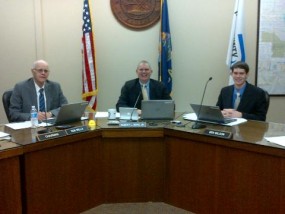Updated: Friday, July 15, 2016 2 p.m.
Riley County commissioners have agreed on the county mill levy for the 2017 budget.
Thursday afternoon the commission agreed to a mill levy of 39.034 — an increase of .767 mills from last year’s budget.
A mill is $1 in tax for every $1,000 in assessed, taxable property value.
While it seemed on Thursday that all three commissioners voted in favor of the budget, KMAN has learned chairman Ben Wilson actually voted against it.
Riley County clerk Rich Vargo called KMAN Friday afternoon about the vote.
Vargo asked if a “no” vote was heard from Wilson.
After reviewing KMAN’s recorded audio of the vote, it doesn’t appear that Wilson voiced favor, but after he asked for opposition, no such voice was raised.
Vargo told KMAN he’d contacted Wilson for clarification and he confirmed he voted against the budget.
Thursday after the vote, Commissioner Ron Wells said it wasn’t to his ideal liking, but thought it was a compromise.
“I’d like to have been close to zero,” Wells said. “But I can live with this.”

Monday, commissioners agreed to eliminate cost of living adjustment (COLA) increases for county employees. The week before, commissioners approved to eliminate both their COLA and step increases for 2017. Step increases for county employees were included in the 2017 budget, however.
County treasurer Shilo Heger told commissioners there could be a dent in employee morale with the lack of COLA increases, saying they’re aware the state-imposed tax lid doesn’t come into play until the 2018 budget and that there is less of reason to ax COLA increases for this budget.
Commissioners told Heger they understood those concerns but agreed a lower overall mill levy was priority.
“As leaders we need to take that bull by the horns and talk to them, talk to our people,” Commissioner Robert Boyd said. “These are things we have to do. It is caused by Gov. Brownback, pure and simple, by the legislature and Gov. Brownback. They’ve created this crisis. And unfortunately it’s going to get worse, I believe, before it gets better. We’ve got a fiscal mine field to go through in the next few years.”
Wilson thought they could have went lower with the mill levy, but Boyd said it was important to not get too “bare bones” in case of any emergency expense that may come next year.
Wells said the county is in much better shape, despite some scaling back, than others in the state.
“There’s 90-some counties that are in really bad shape,” Wells said. “They’re closing roads.”
There will be a public hearing on budget no later than Aug. 15. The final adoption of the budget is scheduled for Aug. 25.


